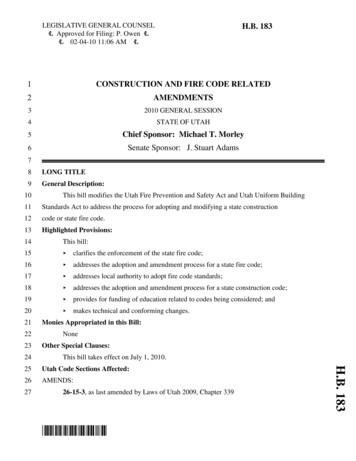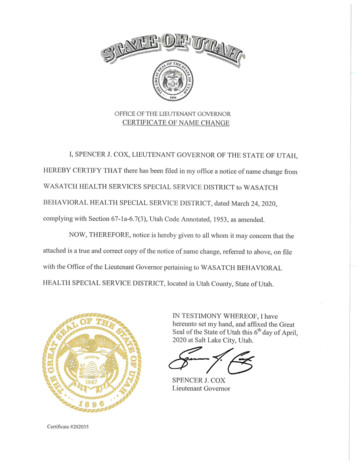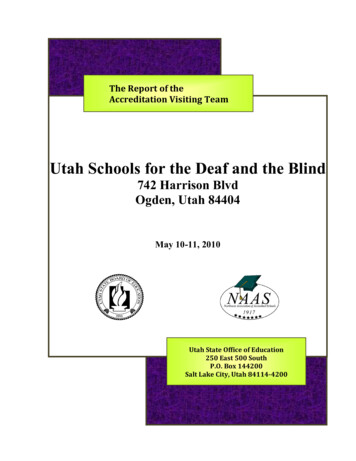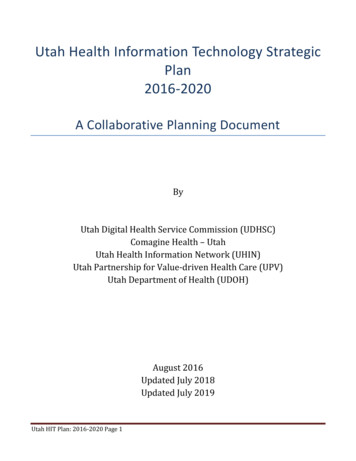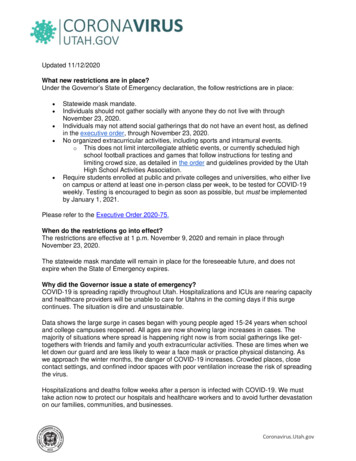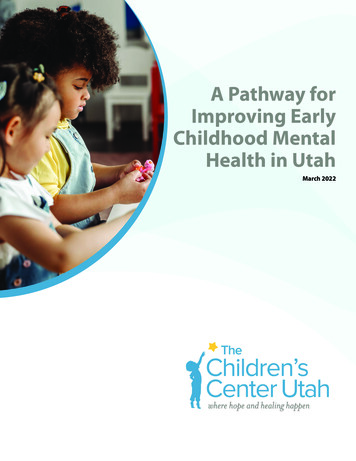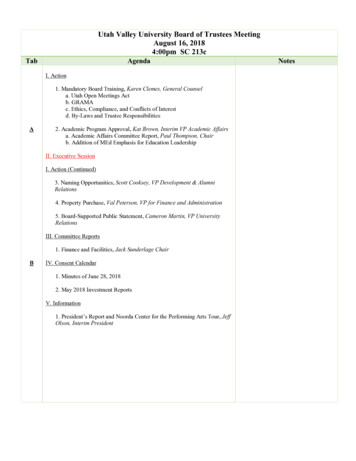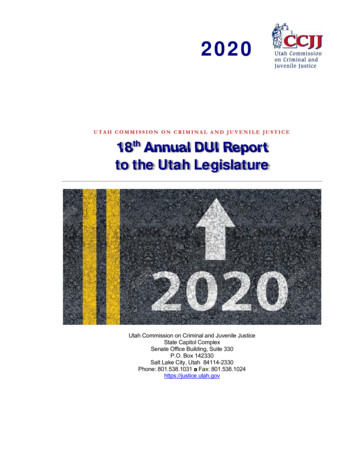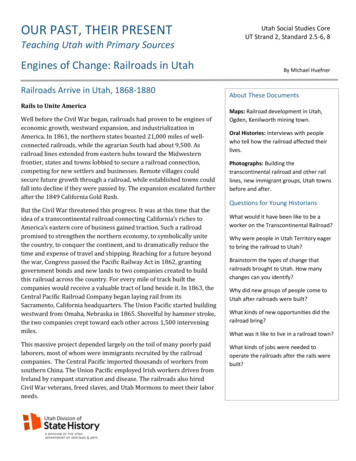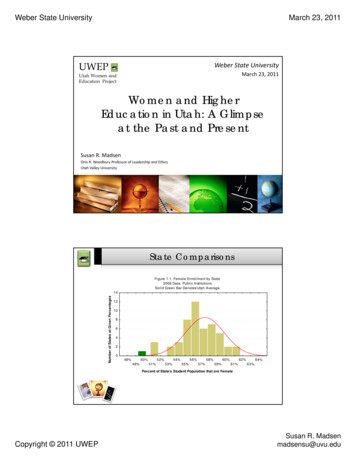
Transcription
Weber State UniversityMarch 23, 2011UWEPWeber State UniversityMarch 23, 2011Utah Women andEducation ProjectWomen and HigherEducation in Utah: A Glimpseat the Past and PresentSusan R. MadsenOrin R. Woodbury Professor of Leadership and EthicsUtah Valley UniversityState ComparisonsFigure 1.1: Female Enrollment by State2008 Data, Public InstitutionsSolid Green Bar Denotes Utah AverageNumber of States at Given 8%57%60%59%62%61%64%63%Percent of State's Student Population that are FemaleCopyright 2011 UWEPSusan R. Madsenmadsensu@uvu.edu
Weber State UniversityMarch 23, 2011Percent of Females AttendingFigure 6.1: Percentage of 18-24 Year Old FemalesEnrolled in Postsecondary Institutions by Year18-24 Students (IPEDS) / 18-24 Residents (Census)44%Percent of General Population that are 1995199719992001Year200320052007National FemaleUtah FemalePurposeThe purpose of the two‐year Utah Womenand Education Project (UWEP) is to leadefforts within the state to understand andthen motivate more young women toenter and stay in school long enough toobtain college degrees.May 2009‐May 2011Copyright 2011 UWEPSusan R. Madsenmadsensu@uvu.edu
Weber State UniversityMarch 23, 2011UWEP Critical Components1. Primary research2. Briefs and reports (www.uvu.edu/wep)3. Online resource database (releasedOctober 4, 2010 on Utah 2‐1‐1)4. Dissemination of findings:conferences, other presentations, andmaterials (marketing)Instrument and Data Collection Protocol– Survey (quantitative)– Interview (open‐ended; qualitative) 245 participants spent between 45 minutes to 3hours to complete instrument– Average time was about 1 hour 30 minutes In‐depth study– Many participants told us they had never thought sodeeply about why they made the choices they maderegarding college and what influenced themCopyright 2011 UWEPSusan R. Madsenmadsensu@uvu.edu
Weber State UniversityMarch 23, 2011Recruiting (1)Live data collection sites:– Snow College– Center for Education, Business, and the Arts—Kanab (with Dixie State College)– Box Elder High School– Salt Lake Community College– Southern Utah University– University of Utah– Utah Valley UniversityRecruiting (2)Online recruits:– Referrals (from college/university employees allover the state)– Postcards (Community Action; DWS, LDSEmployment Center, WIC)– Online ads (Daily Herald, Craigslist, KSL, SurveyMonkey)– Blogs– Cold calls from institutional lists– UVU homepageCopyright 2011 UWEPSusan R. Madsenmadsensu@uvu.edu
Weber State UniversityMarch 23, 2011AgesMarital StatusCopyright 2011 UWEPSusan R. Madsenmadsensu@uvu.edu
Weber State UniversityMarch 23, 2011Race/EthnicityReligionCopyright 2011 UWEPSusan R. Madsenmadsensu@uvu.edu
Weber State UniversityMarch 23, 2011Counties/Regions Counties: Box Elder, Cache, Davis, Emery, Grand, Iron,Kane, Millard, Salt Lake, Sanpete, Sevier, Tooele,Uintah, Utah, Washington, Weber Regions:–––––––Bear River (8.6%)Central (7.4%)Mountainland (32.4%)Southeastern (0.8%)Southwestern (14.8%)Uintah Basin (0.4%)Wasatch Front (34.8%)Years in UtahCopyright 2011 UWEPSusan R. Madsenmadsensu@uvu.edu
Weber State UniversityMarch 23, 2011Study Limitations Lack of participants in minority populationsRecruiting strategies (not random sample)Perceptions (past, present, future)Quantified qualitative data (coding)Use caution when generalizingCausalityUWEP ModelPeople ofInfluencePast Experiencesand alAttributesFamily BackgroundSchool ExperiencesValuesOther Activities sAspirationsTheBehaviorThe CollegeDecisionSubjectiveNormsPerceptions ofthe Past andPresentCopyright 2011 UWEPSusan R. Madsenmadsensu@uvu.edu
Weber State UniversityMarch 23, 2011Presentation Outline1.2.3.4.5.6.7.8.Value of EducationBehaviorIntentionsAspirationsValues and ReligionFamily BackgroundSchooling/Non‐schoolingCollege Decisions/Influences1. Value of Education Informal hypothesis Brief: “The Value of Higher Education for Women inUtah” Utah young women do not generally understand thebroad value of a college/university education More educated—more value they see All but three said that getting more education isimportant/wonderful Many benefits outlined in the brief were notmentioned by any young womenCopyright 2011 UWEPSusan R. Madsenmadsensu@uvu.edu
Weber State UniversityMarch 23, 2011Value of Education (2) Nearly all women who do not attend or who dropout truly believe they will get their degrees in thefuture. Many believe that if their husbands get theeducation for the family, the children/family willget the “benefits” of having educated parents, andthey will have a “better future.” Only four women see becoming leaders as areason to go to college.Value of Education (3) Many women stated that they do not need a collegeeducation because they “will not use it.” Many say they do not want to go to college (or return)unless they know “exactly” what they want to do. Forexample, one states: “I don’t want to waste my time ormoney.” Some participants assume that a number of theircourses (GE primarily) are a “waste” because they donot teach them exactly what they think they need tolearn.Copyright 2011 UWEPSusan R. Madsenmadsensu@uvu.edu
Weber State UniversityMarch 23, 2011Value of Education Categories(1)96.3% Economic, financial, and/or job54.3% Knowledge, learning, intelligence, and beingsmart40.8% Self‐esteem, self‐worth, self‐knowledge,accomplishment32.2% Better life, be successful, opportunities inthe future26.5% Self‐development and self‐improvement26.1% Equity with men/respect for womenValue of Education Categories (2)21.2% Independence20.0% Teach children or be an example to them14.7% Influence society/world, to make a difference11.8% Social benefits and/or improving social skills9.8%8.6%Copyright 2011 UWEPHelping othersCompetencies (critical thinking, problemsolving, community, decision making, humanbehavior, tolerance of others)Susan R. Madsenmadsensu@uvu.edu
Weber State UniversityMarch 23, 2011Differences between CategoriesMore educated women see these educationalbenefits more clearly:–––––Knowledge, learning, and intelligence***Teaching children and being examples tothem*Competencies*Social skills and benefits*Self‐improvement*Correlations:* .05 p-value** .01 p-value*** .001 p-valueBroader ValueYoung women who see the broader value of highereducation are also those who:––––Copyright 2011 UWEPAttend college and graduate***Are more committed to attend***Are more committed to graduate***Have parents who are more educated*Susan R. Madsenmadsensu@uvu.edu
Weber State UniversityMarch 23, 2011TakeawaysYoung women need to be taught the broad value ofhigher education while young.– Parents can teach this value.– English teachers could give assignment to writeabout the benefits of a college education (GEincluded).– Elementary school teachers can bring in guestspeakers (parents) to talk about it and giveassignments around this topic.– Other2. Behavior: The College DecisionPeople ofInfluencePast Experiencesand alAttributesFamily BackgroundSchool ExperiencesValuesOther Activities sAspirationsTheBehaviorThe CollegeDecisionSubjectiveNormsPerceptions ofthe Past andPresentCopyright 2011 UWEPSusan R. Madsenmadsensu@uvu.edu
Weber State UniversityMarch 23, 20113. IntentionsProactive College Activities Scale Saved money for college Discussed financial aid with someone(scholarships, loans, grants) Requested information from a college Visited a college campus Applied to a college Accepted or admitted to a college Received a scholarship or grant to attend Concurrent enrollment AP coursesCollege Preparation Activities Saved money for college Discussed financial aid with someone(scholarships, loans, grants) Requested information from a college Visited a college campus Applied to a college Accepted or admitted to a college Received a scholarship or grant to attendAll are linked to attending andgraduating from collegeCopyright 2011 UWEPSusan R. Madsenmadsensu@uvu.edu
Weber State UniversityMarch 23, 2011Commitment to Attend College Saved money for college [1] Discussed financial aid with someone(scholarships, loans, grants) Requested information from a college Visited a college campus [2] Applied to a college Accepted or admitted to a college Received a scholarship or grant to attend[1,2] predictors from linearmultiple regressionsCommitment to Graduate Saved money for college [1] Discussed financial aid with someone(scholarship, loans, grants) Requested information from a college Visited a college campus [2] Applied to a college Accepted or admitted to a college Received a scholarship or grant to attend [3]Copyright 2011 UWEPSusan R. Madsenmadsensu@uvu.edu
Weber State UniversityMarch 23, 2011High School CoursesAttending and Graduating from College:1.2.3.4.5.6.7.8.9.10.AP [1]High level math [2]Mix of course types—primarily difficult courses [3]Concurrent enrollment [4]Foreign languagesSocial scienceFine artsScience, math, and technologyMixture of course types—primarily electivesCTETakeaways Parents need to encourage and assist their childrenin saving money for college early in life. Influential individuals should provide opportunitiesfor young women to visit college campusesthroughout their high school years and even earlier. Young women should be encouraged to takeconcurrent enrollment, AP, and other collegepreparation courses during high school. The specificreasons for this should be explained clearly.Copyright 2011 UWEPSusan R. Madsenmadsensu@uvu.edu
Weber State UniversityMarch 23, 20114. AspirationsPeople ofInfluencePast Experiencesand alAttributesFamily BackgroundSchool ExperiencesValuesOther Activities sAspirationsTheBehaviorThe CollegeDecisionSubjectiveNormsPerceptions ofthe Past andPresentKey Finding Throughout StudyAnalysis of qualitative results found thatyoung women believe they are beingencouraged to go to college or attendcollege—not necessarily to graduatefrom college.Copyright 2011 UWEPSusan R. Madsenmadsensu@uvu.edu
Weber State UniversityMarch 23, 2011College Degree Sometime in Life?Which Level of Degree?Copyright 2011 UWEPSusan R. Madsenmadsensu@uvu.edu
Weber State UniversityMarch 23, 2011Age of Decision Regarding CollegeAge of DecisionThe age of decision is inversely correlated with Commitment to attend college and graduate(‐***)Actively preparing for college(‐***)Desire for a higher degree level(‐***)Saving money for college(‐***)Having parents who––––Are willing to help pay(‐***)Discussed financial aid(‐**)Give higher level of overall support(‐**)Have a higher estimated income level(‐*)These correlations suggest the younger the decision the better!Copyright 2011 UWEPSusan R. Madsenmadsensu@uvu.edu
Weber State UniversityMarch 23, 2011Commitment to GraduateHowcommittedare you tograduatingfrom collegesometime inyour life?Interaction with MarriageMarital StatusCurrent effect: F(3, 241) 3.6353, p .01354Effective hypothesis decompositionVertical bars denote 0.95 confidence intervals10.510.09.5Commitment to right 2011 UWEPSeparated/DivorcedLiving with partner/significant otherSusan R. Madsenmadsensu@uvu.edu
Weber State UniversityMarch 23, 2011Career Aspirations and Future Lifestyle1 Not important; 4 Essential3.633.613.293.233.103.103.092.86Raising a familySecure and stable futureWork schedule with timeLeave the world a better place***Helping others in difficulty***Being well‐off financiallyBeing stimulated intellectually***Variety of work experiences and challenges***Correlations: Commitment to Attendand Commitment to GraduateCareer Aspirations and Future om to schedule my own day* (‐)Doing creative or expressive workWorking closely with people***Encountering a variety of people***Successful in own businessWorking for social change***Recognition from others in fieldAdministrative responsibility**Influence political decisions*1 Not important; 4 EssentialCopyright 2011 UWEPSusan R. Madsenmadsensu@uvu.edu
Weber State UniversityMarch 23, 2011AspirationsTakeaways Approximately 90% of the young women (yes/no item) saythey want a college degree in their lives sometime; however,in the qualitative results only 50% aspire to get an A.S.degree or higher. Researchers and educators need to explore the disconnectbetween the quantitative and qualitative results on youngwomen’s aspiration to attend and graduate from college. Either way, we need to support their aspirations and dreamsto make them a reality. Religious community can support college aspirations, sincereligious involvement is correlated with proactive collegeactivities.Copyright 2011 UWEPSusan R. Madsenmadsensu@uvu.edu
Weber State UniversityMarch 23, 2011Takeaways Many women aspire to be a mother as well as a professional.Educators can help prepare women realistically for dual roles(or lead change for working mothers). Educators should address the needs of the 60% who want tolearn outside of classroom, e.g., online classes or off‐sitelocations. Parents and other influential individuals should discusscollege with children as young as possible. We should talk to young women about “graduating”—notjust “attending”—from college early in life.5. Values/ReligionWhat does your religion teach you about continuingyour education after high school?Copyright 2011 UWEPSusan R. Madsenmadsensu@uvu.edu
Weber State UniversityMarch 23, 2011Church EncouragementI feel like my religion (LDS) strongly encouragescontinuing education after high school. Our churchteaches that knowledge is the only thing you take withyou when you die (not cars, homes, etc.). I believe this,and that is partly why I went to college. Women arealso encouraged by our church leaders to earn acollege degree. Family is extremely important in ourchurch, but the top leaders strongly encourage womento gain an education so they can teach their childrenand help support their families.Top Church LeadersWhat messages do you think are given from yourtop church leaders (e.g., Pope, prophet) aboutwomen earning college degrees?Copyright 2011 UWEPSusan R. Madsenmadsensu@uvu.edu
Weber State UniversityMarch 23, 2011Perception of TeachingsMy religion teaches education is not merely agood idea, it’s a commandment. We are tolearn of things of both in the heaven and in theearth. They say it’s important to strive, learnand study in our lives and seek knowledge fromthe best books. They encourage gettingeducation but do not expect us to get a degree.Local Church LeadersDo your local church leaders (e.g., youth leaders,bishop, rabbi, minister) talk to you about youreducation? If so, what do you think they areencouraging you to do with your educational andcareer choices?Copyright 2011 UWEPSusan R. Madsenmadsensu@uvu.edu
Weber State UniversityMarch 23, 2011Findings (1) LDS participants felt strongly that their religionsupports women attending college. They are taughtthat learning, knowledge, and college are important. Some say if they were more active in the LDS faith,they would probably have attended college. Many talk of the importance of attending college, butnot necessarily about graduating. Many see no urgency; they believe they will finish“someday.”Findings (2) Family trumps college “absolutely” for manyparticipants. Marriage (or sometimes when a child isborn) is the end of college for many. Many believe that women need to “give up” or“sacrifice” their college for the family. It is their “duty”to drop out of school. Many cannot see a situation where they can bemarried, have children, and continue college. It is allor nothing. They cannot see a life of integration. Theydo not see options.Copyright 2011 UWEPSusan R. Madsenmadsensu@uvu.edu
Weber State UniversityMarch 23, 2011Findings (3) Education gets lumped together with “work”; a“faithful LDS woman” stays home with her children(that means no outside work or education). There is a disconnect with “being prepared” or“having a job to fall back on” and not finishing withthe degree. Some participants struggle with understandingwhy education is so important before marriageand then why they must “give it up.”Findings (4) Education doesn’t just slide to second priority—for someit falls totally off the priority list. Of the three categories mentioned, encouragement from“local leaders” is the most powerful predictor ofcommitment, proactive college activities, and attendanceand graduation. All three religious variables show powerful correlationswith commitment, proactive college activities, andattendance and graduation.Copyright 2011 UWEPSusan R. Madsenmadsensu@uvu.edu
Weber State UniversityMarch 23, 2011Religious ActivityReligious activity is a strong predictor of the following(in various models):–––––––Attendance and graduationProactive college scaleTotal leadershipHigh school GPAAge of decisionFather encouraged and/or supportedMother encouraged and/or supportedTakeaways Local church leaders play a particularly important role inencouraging young women to attend and graduate fromcollege. Efforts should be made to discuss how young women canintegrate marriage, family, and college. Realistic data (e.g., divorce rates, economic challenges)should be presented in church settings so that youngwomen understand the importance of completingdegrees and the importance of family.Copyright 2011 UWEPSusan R. Madsenmadsensu@uvu.edu
Weber State UniversityMarch 23, 20116. Family Background Father Mother Paying for collegeOther Data Not Discussed Siblings Relatives Family responsibilitiesFathers’ EducationThe higher the level of a father’s education, the morelikely his daughter willPrepare for college attendance (proactive activities).Attend and graduate from college.Receive more encouragement and support to attend.Develop a love for learning.Have a father who reads to her, helps her with homework,develops activities, and attends learning and culturalevents.– Have a father who sets a positive example of gainingknowledge and learning.–––––Copyright 2011 UWEPSusan R. Madsenmadsensu@uvu.edu
Weber State UniversityMarch 23, 2011Fathers’ ActionsWhat did fathers do to help their daughters learn?––––––––Read to them*Homework/school projects**Learning and cultural events/activities*** [1]Attended school events**Encourage learning but not necessarily collegeSet positive example*** [1]Set negative example—motivated them positivelyHelped them develop a love for learning****Correlations to Category II[1] Predictors of ProactiveQuoteMy father has helped me develop a deep love forlearning. I remember when I was in 2nd grade Ihad an obsession with reading; my dad wouldsuggest books to me, and sometimes even readthe books at the same time as me so that we coulddiscuss the plots. I remember always trying toread as quickly as he would when we were readingbooks at the same time so that he wouldn't haveto wait for me to turn the page, of course, hedidn't really mind waiting for me.Copyright 2011 UWEPSusan R. Madsenmadsensu@uvu.edu
Weber State UniversityMarch 23, 2011Influence of FathersTakeaways Efforts should be made to educate fathers regardingthe critical role they hold in encouraging andsupporting their daughters to be educated. Emphasis should be placed on helping fathersunderstand the importance of taking one‐on‐one timeto read, do homework, and create learning activitieswith/for their daughters. To the fathers: Your daughters are watching andlearning from you.Copyright 2011 UWEPSusan R. Madsenmadsensu@uvu.edu
Weber State UniversityMarch 23, 2011Influence of Educated MothersA mother’s education level was correlated with adaughter who: Actively prepared for college***Had a mother who attended college as a mom***Was encouraged to attend college**Talked with her mother about college**Received help with schoolwork**Developed a love of learning*Attended cultural and outside events*Talking to Parents About CollegeCopyright 2011 UWEPSusan R. Madsenmadsensu@uvu.edu
Weber State UniversityMarch 23, 2011Provided Encouragement/SupportTakeaways Mothers could talk frequently to their daughters, startingwhen they are young, about attending college. Mothers could strongly encourage their daughters toattend college. Mothers could advise their daughters that there is value inboth education and family life. Mothers who regret not attending college should discuss itsimpact on them with their daughters. Mothers could help with homework and take anactive interest in school and preparing for college.Copyright 2011 UWEPSusan R. Madsenmadsensu@uvu.edu
Weber State UniversityMarch 23, 2011Percent Parents Agreed to PayPercentage of CollegeCosts to PayNone25% of college costs50% of college costs75% of college costs100% of college costsPercentage of WomenParticipants53.1%15.1%12.7%8.6%9.8%Financing CollegeWhat did parents say about financing college?Willing to help and encouraged grants, loans,and scholarshipsWilling to helpEncouraged grants, loans, and/or scholarshipsNot willing/unable to helpTalked but unknown outcomeDid not mention topic in narrativeCopyright 2011 UWEPPercent10%24%12%15%11%27%Susan R. Madsenmadsensu@uvu.edu
Weber State UniversityMarch 23, 2011Takeaways Educate the parents of young girls about financial aid, sothey can discuss it with their daughters early. Encourage parents to discuss attending and paying forcollege with their daughters at a young age (e.g., savingmoney or financial aid options). Teachers could discuss college options with young girls andwomen and encourage them to have additionalconversations with their family members. Inform parents that support can be financial, material (e.g.,books), living arrangements, and/or emotional.7. Schooling/Non-Schooling Copyright 2011 UWEPCollege preparation during high schoolHigh school leadershipHigh school activitiesTime spent in high schoolGPASchooling experiencesPeople in school (counselors, teachers, administrators)Friends and peersOther influential individualsSusan R. Madsenmadsensu@uvu.edu
Weber State UniversityMarch 23, 2011College Prep During High SchoolQualitative results outline the most influentialcollege preparation activities during high school:1. College fairs/career fairs (individualconversations with people from colleges)2. Field trips to colleges/universities3. Presentations in classes (e.g., English)4. Assemblies5. SEOP6. Published information (e.g., brochures,pamphlets)7. Assessments (comment about middle school)High School LeadershipCopyright 2011 UWEPSusan R. Madsenmadsensu@uvu.edu
Weber State UniversityMarch 23, 2011High School Religious youth organizations***[2]MusicHigh school athletics/sports*School clubs or associations***Volunteer service***Club or community sportsHonor society***[1]Drill/cheerDrama/theaterStudent government*Literary or other magazineNewspaperDebate/speechProfessional organizations/associationsPolitical groupsTime Spent in High School: GPAA higher GPA is linked to ––––––––More hours exercise/sports [1]More hours participating in clubs [5]More time studying and doing homework [2]More time volunteering in the communityLess household or childcare duties [4‐]Less time partyingLess time socializing face‐to‐face with friends [3‐]Less time watching TVSimilar to ACT scores andattendance and graduation.Copyright 2011 UWEPSusan R. Madsenmadsensu@uvu.edu
Weber State UniversityMarch 23, 2011Time Spent in High School: ClubHigher number of hours spent in high school club‐related activities correlates with ––––––––Attendance and graduation from college [4]Better gradesMore exercise/sportsLess household chores [2‐]More studying or homeworkMore time talking to teachersMore volunteer work [1]Less time watching TV [3‐]Time Spent in High School: WorkingHigher number of hours spent working for pay inhigh school correlates with ––––Copyright 2011 UWEPLower attendance and graduation from collegeMore partyingMore socializing with friends (face‐to‐face)More time watching TVSusan R. Madsenmadsensu@uvu.edu
Weber State UniversityMarch 23, 2011Takeaways Schools can host college fairs and provide opportunitiesfor students to take fields trips to campuses. Efforts can be made to emphasize a strong high schoolGPA, with college as a goal. Efforts can be made to encourage participation inactivities that provide leadership opportunities. Young women can be encouraged to join school clubsand volunteer in their communities. Working too many hours for pay may result in lesslikelihood of attending and graduating from college.Schooling ExperienceOverall experience in school is linked tocommitment to attend/graduate from college.Copyright 2011 UWEPSusan R. Madsenmadsensu@uvu.edu
Weber State UniversityMarch 23, 2011People in School AdministratorsCounselorsTeachersCoaches and club advisorsQuotes about AdministratorsMy principal really made me feelexcited about the idea of going tocollege. He encouraged me to do mybest, and to keep going. I think one ofthe biggest things that made an impacton me was that he was willing to learnwho I was by name, my situation, andhe took the time to give me advice.My assistant principaltold me that I basicallycouldn't be a teachersomeday because it wasa very difficult job.Copyright 2011 UWEPNot a lot of administratorshad interest in myeducation.My school's administrators wereapathetic towards me and feltlike there was no point in talkingwith me since my attitude wasso discouraged.Susan R. Madsenmadsensu@uvu.edu
Weber State UniversityMarch 23, 2011High School CounselorsInfluence of CounselorsCopyright 2011 UWEPSusan R. Madsenmadsensu@uvu.edu
Weber State UniversityMarch 23, 2011Fun QuoteThe career counseling I remember was in junior high,and they asked me what I wanted to be when I grew up,and I said a dancer (I had never danced a day in my life).They wrote it down and put me in classes to help meget there (PE). The next year I switched to zoology sothey put me in science classes. much more up my alley.But really what was I supposed to know about careersat thirteen and fourteen. Yikes a dancer?Disturbing QuoteThe counselor in High School talked about my goalsfor college (with my mom there). He asked what Iwanted to be, and I told him veterinarian. He thenpulled up my grades (3.4 GPA average) and told methat I should not waste my time being aveterinarian because I did not have the grades forit. That was devastating to hear, and I believed him.Copyright 2011 UWEPSusan R. Madsenmadsensu@uvu.edu
Weber State UniversityMarch 23, 2011Counselor Findings Counselors specifically assigned (e.g., ETS,school or career) were particularly influential. One‐on‐one (outside SEOPs) are most powerfulinfluences. Correlations and predictors:––––Commitment to attend collegeCommitment to graduate from collegeProactive college activities [1]Attending and graduating from collegeTeachersCopyright 2011 UWEPSusan R. Madsenmadsensu@uvu.edu
Weber State UniversityMarch 23, 2011Quote about TeachersThe worst part of high school was when I had morethan one teacher tell me that I would never goanywhere in life, never amount to anything andnever succeed. I know they say sticks and stoneswill break your bones but words will never hurtyou, well, they do, and they totally hurt me. It tooka while to shake off those hurtful things that weresaid to me, but I powered through everything andthen ended up getting super good grades myjunior and senior year.CoachI was a statistician for the wrestling coach who wasalso my English teacher. He was another greatinfluence on me. During my MATC schooling my senioryear we had to prepare a career packet whichconsisted of a resume and a referral letter from anadult. He was obliged to provide the letter for me andafter reading it, I realized how much confidence hehad in my abilities to learn, and be a wonderfulcontributor to society. This one letter provided mewith the confidence and self worth I had beenstruggling to find for years.Copyright 2011 UWEPSusan R. Madsenmadsensu@uvu.edu
Weber State UniversityMarch 23, 2011Findings Lack of teacher influence is obvious with many participants(not one teacher talked to them even once about college). Those who felt they had “great teachers” in high school weremore likely to attend and complete college. Many students feel teachers have not prepared them forcollege. Some young women not viewed as being “on the collegetrack,” found counselors and teachers didn’t discuss collegewith them. Young women do not know their strengths; they are muchmore aware of their weaknesses. They get “evaluated” but many never get accurate“feedback.”Influential People1.2.3.4.5.6.7.Local church leaders*** [2]Teachers*Friends* [3]Mother* [5]RelativesFather [4]School counselors [1]1 predictors of Category II[1,2,3,4,5] significant predictors ofproactiveCopyright 2011 UWEPSusan R. Madsenmadsensu@uvu.edu
Weber State UniversityMarch 23, 2011Other Influential IndividualsDescribe how others (examples: neighbors,employers, community members) have influencedyour ideas and decisions about %9.5%Many outside people influenced meNo influence from others***(‐) [1]Influence from employers*Influence from neighbors*Influence from church/community members*[2]Influence from family friends [3][1,2,3] predictors ofproactive college preparationQuestions about College[1,2] predictors of category II[A
Kanab (with Dixie State College) - Box Elder High School - Salt Lake Community College - Southern Utah University - University of Utah - Utah Valley University Recruiting (2) Online recruits: - Referrals (from college/university employees all over the state) - Postcards (Community Action; DWS, LDS
